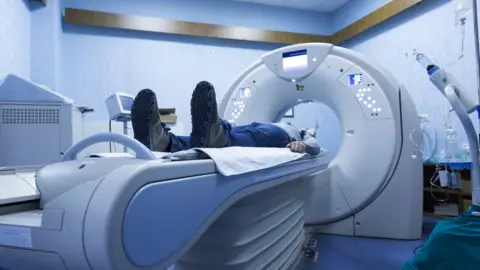Brexit 'likely to cause cancer test delays'
 Getty Images
Getty ImagesHospitals are likely to experience delays to cancer testing and treatment regardless of the result of next week's Brexit vote, BBC Newsnight has learned.
The Royal College of Radiologists has told doctors to prepare for possible delays for some drugs used to detect cancer if there is a no-deal Brexit.
It says clinicians should reduce their workload in the days after 29 March, when the UK is due to leave the EU.
The government said it had "robust" plans for however the UK leaves the EU.
MPs will vote on Prime Minister Theresa May's Brexit withdrawal agreement by 12 March.
If Parliament does not vote in favour of her deal and there is no extension of Article 50 - the two-year process for leaving the EU - the UK will leave with no withdrawal agreement, known as a no-deal Brexit.
The five-page guidance to doctors from the Royal College of Radiologists (RCR), seen by Newsnight, warns that some radiopharmaceutical suppliers "anticipate there may be some delay to their delivery times".
It advises clinicians to: "Keep [your] workload lighter for the first week following a no-deal Brexit, in order to see more clearly what the impact is likely to be."
It adds: "In the weeks leading up to Brexit you should consider how to prioritise requests based on clinical need, should supplies be compromised."
The guidance refers to the radioisotopes commonly used in the diagnosis and treatment of some cancers.
These cannot be stockpiled in advance because of the rapid decay of their radioactivity and "a one-day delay to delivery would reduce available activity by approximately 20%", according to the guidance from the RCR.
'Patients health at risk'
A spokesman for the RCR told Newsnight the organisation now believed it was "inevitable" that uncertainty over Brexit would cause delays to some cancer tests and treatments.
Dr Richard Graham said: "Of course, now there will inevitably be delays to treatment as a result of the Brexit process because we need to start booking our lists for the post-Brexit date.
"We will need to book clinics less heavily so that we've got more wriggle room if we don't have the radioisotopes in order to diagnose and treat the patients."
Dr Graham said the RCR had met with the Department of Health and Social Care several months ago "when they were very optimistic that there would be a deal" and that the guidance would not be necessary.
"But unfortunately now it looks like no deal really is a tangible possibility, so it's vital that we get this guidance out now so patients treatment and diagnosis is disrupted at the bare minimum."
Dr Graham said it would have been "much easier" for medics if they had known that a no-deal Brexit was not going to happen.
"But of course we understand that might be a negotiating strategy to get the best deal for the country.
"Putting patients' health at risk for the sake of getting a good Brexit deal is a difficult priority to balance."
'Robust contingency plans'
The Department of Health and Social Care has asked radiopharmaceutical suppliers to use air freight in the event of a no-deal Brexit, as that is expected to cause road disruption.
But the guidance states that "some companies feel their plans will ensure no delays but others anticipate there may be some delay to their delivery times".
And on one specific type of treatment, known as radionuclide therapy, it states that "only one supplier has been confident it will be able to deliver therapy doses on particular required days".
The radiologists' warning that it is now too late to escape some disruption - even if Mrs May secures majority Parliamentary support for her withdrawal agreement - follows similar statements from other sectors.
UK-based financial firms have already had to establish offices elsewhere in the EU in case they suddenly find themselves unable to service European clients from 29 March.
And surveys show that stockpiling by manufacturing firms is at the highest level on record due to the fear of a no-deal Brexit.
A Department of Health and Social Care spokesperson said: "Leaving the EU with a deal remains the government's top priority.
"As a responsible government we have robust contingency plans in place so patients can continue to have access to medicines, including medical radioisotopes, whatever the EU Exit outcome.
"We have worked with the pharmaceutical industry to ensure that planes are contracted to bring in medical radioisotopes under the appropriate specialist conditions and suppliers are working closely with the NHS to minimise any potential impact of changes to delivery times."